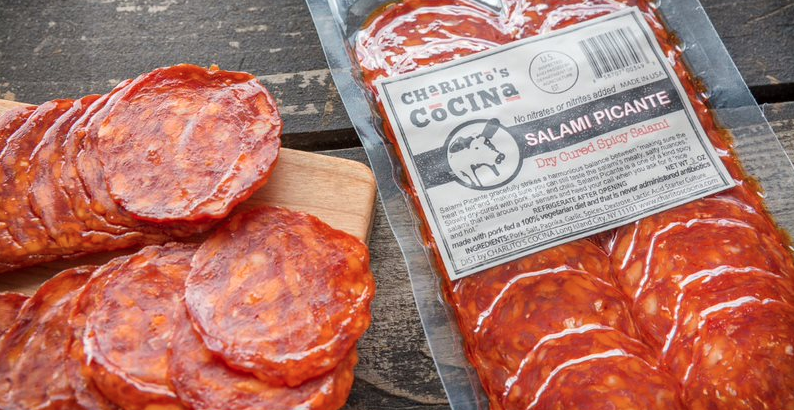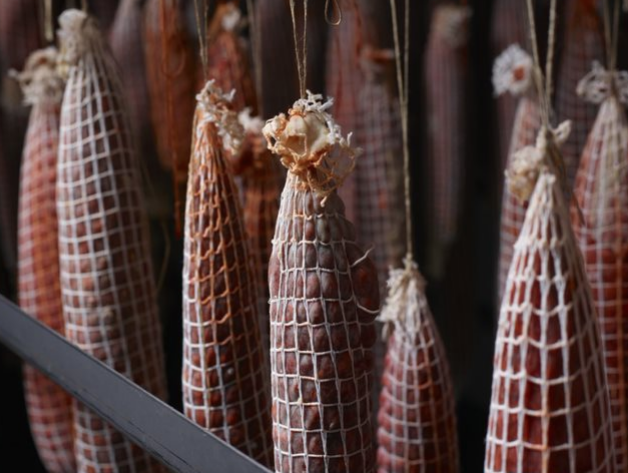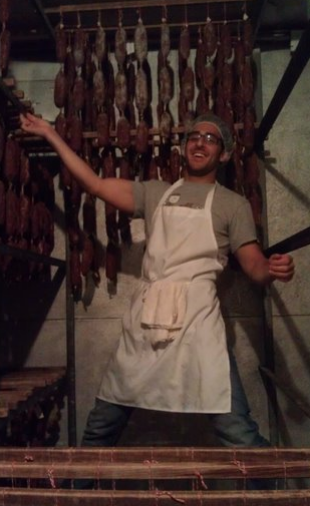
To celebrate Hispanic Heritage Month, we sat down with Charles “Charlito” Wekselbaum, founder of Queens, New York’s Charlito’s Cocina, a beloved producer of hand cured meats made using traditional Spanish techniques. Founded in 2011, this growing operation focuses on using simple, premium ingredients to craft mouthwatering charcuterie infused with the wisdom of generations. We spoke to Charles about his own heritage and how that background influences his relationship with food today.
In what ways did both your Jewish and Cuban heritage influence the traditions you grew up with? Especially as they pertained to familial gatherings and what you ate?
The Cuban heritage came from my Father who enjoyed Cuban food, but wasn’t hellbent on cooking it at home, nor was he much a picky eater. However, this notion that I was descended from an independent minded person who grew up in a Jewish household in a pork eating culture, and really appreciated both of those things, was never lost upon me. In that sense, the Cuban culture at home, at least overtly, came in the form of other things – personality, work ethic, humor. I, on the other hand, loved Cuban food, so would seek it out any chance I could, which, in NYC, was not always easy. Often, in my cravings for Cuban food, I settled for what was more accessible and usually scratched the itch – Puerto Rican food, Dominican Food, and got my real Cuban fix when we’d go to Miami to visit my grandmother, brother, and some other family members.
As far as how my Cuban heritage influenced the traditions I grew up with – its influence was omnipresent, exerting itself both directly and indirectly. I can imagine that many immigrants and kids of immigrants may relate to this – but when you are an “other,” that otherness holds a tremendous influence on the way people relate to you, and how you are defined, especially if there aren’t many “others” like you in your community, which was certainly the case with me. So these facts that my father was “a Cuban,” and we “the Cuban Jews,” helped amplify the existence of this heritage in our home and in my identity. Simultaneously, this sense of “otherness” evolved as a defining element of my own identity, driven by the importance of embracing one’s individuality, and the individuality of others, while remaining cautious of labels.
A summation of migration made on multiple occasions by my father played over and over in my head, and sums this feeling well: “In Sancti Spiritus (the where he was born) we were the “polacos.” In Havana (where he moved at age 17) we were the campesinos, and in New York we were the Puerto Ricans.”
How has your heritage influenced how you’ve built your business and the products you’ve chosen to make and sell?
For starters, the name “Charlito” is an affectionate nickname that I’d been given by various people since I was a kid. As the son of Eastern European Jewish immigrants to Cuba, my father had a strong work ethic and sense of entrepreneurship instilled in him. I don’t know if this is “cultural,” or a product of “heritage,” but this notion that you can create your own job, and should work persistently to do it, certainly feels like part of our family’s “culture.”

Our products have been influenced by a number of factors, some influenced, some not, by my “heritage.” I will say this – I first tasted chorizo at a Spanish restaurant in New York that I used to go to with my father for years. Although not a dry cured chorizo like we make, there’s no doubt that I wanted to produce something that felt as good in memory, and evoked such connection to loved ones, as those chorizos that I used to eat at Malaga Restaurant still do for me to this day.
Why is it important to you to preserve traditional recipes/foods?
At the very least, it is a way to stay connected to the people who paved the way for us, to keep their memories alive, and to acknowledge their lives. Preserving traditional recipes/foods is about so much more than the actual foods and recipes. It is about educating ourselves and our kids that things don’t just appear, but need to be made, somehow, some way. It helps in our understanding of appreciation, and our efforts to not take for granted all the work that goes into making food edible, and creating the things that we need to sustain our lives. Preserving traditional recipes/foods is challenging, and the best feelings are those that come when we’ve accomplished something that was challenging.

It helps to cultivate a sense of self worth, a sense of connection to others. It helps us explore the inner workings of ourselves, and deepen our understanding of who we are, what we like, what makes us feel good, what makes us feel bad. It helps us become better thinkers, more compassionate people, and more fulfilled people. It gives us a reason to connect with each other, and those connections often become the building blocks of our lives. Traditional recipes and foods give people from different places, different walks of life, different realities, a reason to meet, to start a conversation. And, often times, these recipes and foods make us feel good! And everyone deserves to feel good.
Do you have a favorite traditionally Hispanic food to make at home?
Roast pork, rice and beans, congris with little bits of crispy pork, pastel en hoja (my wife is of Dominican heritage, so her family introduced me to this one), tostones, Cuban bread with lard, arroz con pollo, chicharrón.
What about to seek out here in our city?
So many great spots- here are 5 that I love:
1) Elsa, la Reina del Chicharrón in Washington Heights at 173rd St. and St. Nicholas
2) Tropical Spanish Restaurant at 157th St. and Broadway
3) Casa Enrique in Long Island City
4) Rincón Criollo on Junction BLVD in Queens
5) La Isla on 104th St. and 3rd Ave in Manhattan
Want to explore more delicious charcuterie from Charlito’s and beyond? Take a look at our selection here.

